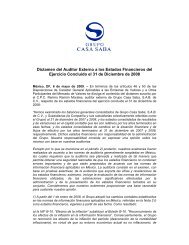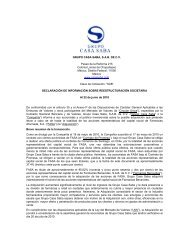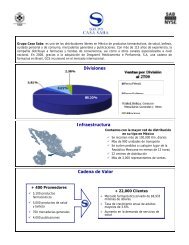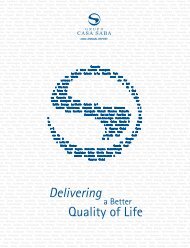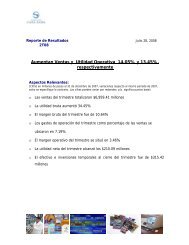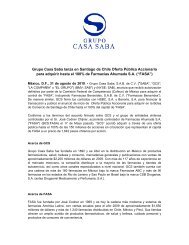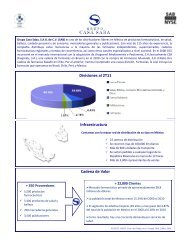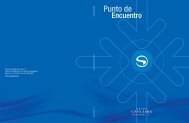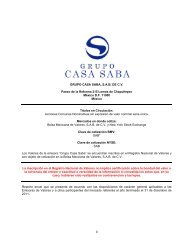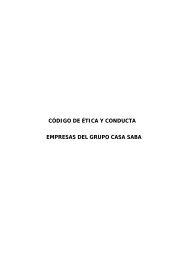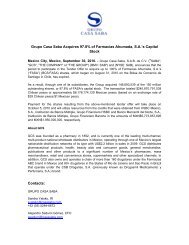FORM 20-F Grupo Casa Saba, S.A.B. de C.V.
FORM 20-F Grupo Casa Saba, S.A.B. de C.V.
FORM 20-F Grupo Casa Saba, S.A.B. de C.V.
You also want an ePaper? Increase the reach of your titles
YUMPU automatically turns print PDFs into web optimized ePapers that Google loves.
Table of Contents<br />
In August <strong>20</strong>09, ANVISA adopted new rules for the sale of products in pharmacies in an effort to curb self-medication. Resolution RDC 44/09 prohibits the sale of<br />
convenience products and other services not related to health and personal hygiene. In addition, pursuant to the new rules, pharmacies will be required to place several products,<br />
including common over-the-counter drugs like analgesics and antacids, behind the counter. The new rules came into effect on February 18, <strong>20</strong>10. We believe such rules are not legal and<br />
that ANVISA went beyond its powers in issuing them. Based on the foregoing, Abrafarma, the Brazilian Association of Pharmacy and Drugstore Networks of which our subsidiary<br />
Drogarias is a member, has filed for an injunction for the benefit of its members against the application of the new rules. In January <strong>20</strong>10, a fe<strong>de</strong>ral court in the Fe<strong>de</strong>ral District granted<br />
the injunction to Abrafarma and its members, including Drogarias, against the application of the above-mentioned rules. If such new rules were to be applied to Drogarias, its business,<br />
results of operation and financial condition may be adversely affected.<br />
Currently, Brazil’s Fe<strong>de</strong>ral Pharmaceutical Council, Conselho Fe<strong>de</strong>ral <strong>de</strong> Farmacia, is consi<strong>de</strong>ring a draft resolution that would require that over-the-counter<br />
medications, such as analgesics and antacids, may only be sold if prescribed by a pharmacist. If approved, we believe such regulation could have an adverse effect on the operations of<br />
our subsidiary Drogarias.<br />
The sale of pharmaceutical products in Brazil is subject to a tax rate of up to 19%, one of the highest in Latin America. Further increases in the taxes applicable to the<br />
sale of the products we sell may adversely affect our results of operation and our margins in Brazil to the extent that we are not able to pass on such costs to the end-consumer, for<br />
example, as a result of price controls.<br />
Changes in Chilean Regulations Relating to the Sale of Pharmaceutical Products and Retail Pharmacy Operations May Adversely Affect Our Business. The<br />
Chilean National Congress is currently discussing a bill by means of which the Chilean Sanitary Co<strong>de</strong> intends to be modified in or<strong>de</strong>r to regulate several aspects of the pharmaceutical<br />
industry: including, among other, the (i) prohibition on giving any type of incentive to the sellers of pharmaceutical establishments, (ii) banning vertical integration between<br />
pharmaceutical chains and laboratories, (iii) regulatory requirements on price information for medicines, and (iv) authorization of the retail sale of certain drugs in stores different from<br />
pharmacies or drugstores. We cannot predict the effects of such amendments, nor assure that more stringent measures will not be implemented by the Chilean government. Changes to<br />
the manner in which the pharmaceutical industry, as well as the sale of pharmaceutical products and retail pharmacy operations are regulated in Chile may adversely affect our results of<br />
operations.<br />
In response to the <strong>de</strong>vastating earthquake that struck Chile in <strong>20</strong>10, in <strong>20</strong>11 the Post-Earthquake Country Reconstruction Financing Law (Ley <strong>de</strong> Financiamiento para<br />
la Reconstrucción <strong>de</strong>l País Post-Terremoto) (Law No. <strong>20</strong>.455) was enacted. As a result, the first category income tax rate was temporarily raised from 17% to <strong>20</strong>%. Although this<br />
change had a negative impact on the results for the period, it did not adversely affect us from an accounting and taxation perspective, given that it is a <strong>de</strong>ferred tax that can be<br />
compensated with tax losses.<br />
The Chilean Health Institute (Instituto <strong>de</strong> Salud Pública <strong>de</strong> Chile) issued a resolution by means of which certain bioequivalence analysis were required to be filed<br />
with respect to some pharmaceutical products called monodrugs (monodrogas), on January 31, <strong>20</strong>12 at the latest. Such analyses will be consi<strong>de</strong>red as a registration requirement for<br />
some generic medicines, and the lack of such analyses may give rise to cancelation from the sanitary registrar for generic medicines. The performance of the bioequivalence analysis<br />
does not <strong>de</strong>pend entirely on us, so if the Company’s subsidiaries fail to comply with the ruling, it may cause shortages in the supply of certain medicines.<br />
Natural Events that May Occur as a result of Climate Change in Regions where we Operate could have Adverse Effects on the Company, such as the Temporary<br />
Cessation of Operations, <strong>Grupo</strong> <strong>Casa</strong> <strong>Saba</strong> and its subsidiaries have operations in Mexico, Chile and Brazil, countries which, like many others, have experienced natural disasters such<br />
as hurricanes, earthquakes, floods, volcanic eruptions, etc. As a consequence of the drastic climate changes that have been i<strong>de</strong>ntified by the scientific community in recent years, the<br />
risk of natural disasters caused by climate change may increase in number or intensity, which could adversely affect the Company.<br />
Mexico City, the seat of our headquarters, has been affected by unusual and continuous seismic activity during the first months of <strong>20</strong>12. Also, in late March <strong>20</strong>12,<br />
central Chile was struck by a magnitu<strong>de</strong> 7.1 earthquake and subsequent quakes have followed. Some of our most important business operations are concentrated in Mexico City and<br />
Santiago, Chile. Therefore, if such strategic locations were subject to a natural disaster, our employees, customers and suppliers could be exposed to the cessation of operations which<br />
could adversely affect the Company.<br />
18



